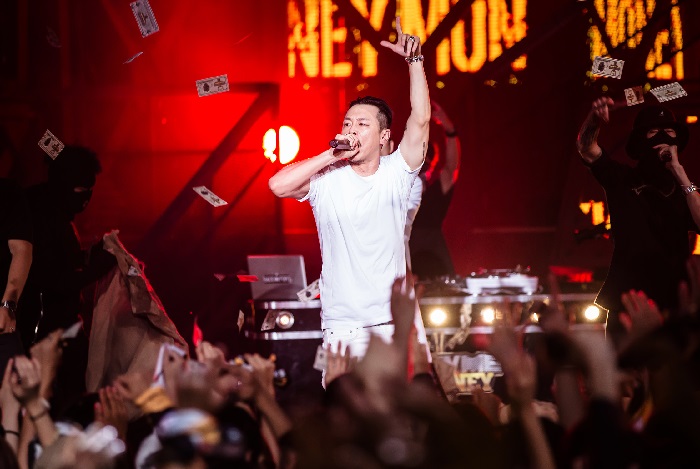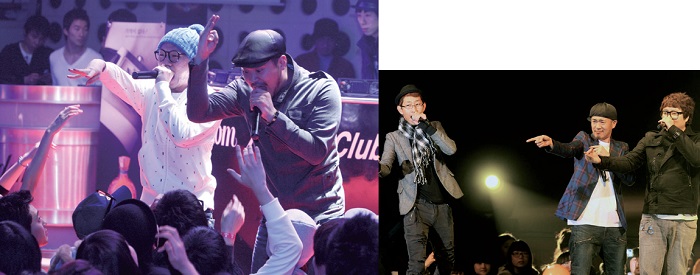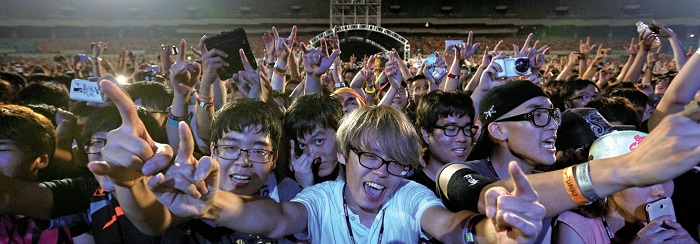View this article in another language
- 한국어
- English
- 日本語
- 中文
- العربية
- Español
- Français
- Deutsch
- Pусский
- Tiếng Việt
- Indonesian
One night in Hongdae, this writer found herself magnetized by a young crowd huddled around two guys who were spitting out rhymes along with some beats. The playground felt like it had transformed into a small club, with people raising their hands up and bobbing their heads to the beat as the two guys churned out impressive raps, one after the other.
In a country that is seemingly dominated by pop, it was refreshing to see that more urban music styles aren’t exclusively kept underground. Hip-hop groups such as Drunken Tiger, Dynamic Duo and Epik High, as well as solo artists like Beenzino, can be heard on mainstream radio and even seen performing on major music shows. It could be said that hip-hop is now enjoying some well-deserved attention alongside mainstream music. However, that was not always the case.

Dropping the Beat
In an interview with Fuse News, Drunken Tiger’s Tiger JK recalled how the hip-hop scene was back in the early ‘90s. “Back in the day, it was like crazy. Hip-hop existed, but it was crazy underground. It was almost like a secret society.”
Because hip-hop was a relatively new genre to the music industry then, the artists had a lot of room for experimentation and growth. In an e-mail interview with KOREA Magazine, Jerry.K, one of the founders of the now-defunct hip-hop label Soul Company that was a force in the early days of hip-hop in Korea, said, “Generally, in the mid- to late-90s, the scene had a relatively shoddy sound and rap wasn’t localized enough. Then in the mid-2000s, great artists started to see the light in the major and underground scene so that it has now gotten a position in mainstream music.”
The earlier days of Korean hip-hop saw artists like the pioneering group Seo Taiji and the Boys, who introduced rap to mainstream listeners. Other groups that shook the scene include Uptown, DJ DOC, Cho PD and Jinusean, who mainly incorporated a lot of English words in their lyrics primarily because the Korean language has different pronunciation and strong syllables that make rapping difficult.
It wasn’t until rapper-producer Verbal Jint was able to come up with a “rhyming formula” that made rapping in the vernacular easier and more natural for local artists.

Cashing in on the Local Tongue
The development of a hip-hop music industry in Korea became more apparent as more artists honed their craft. Alongside Verbal Jint, who revolutionized Korean rap, Jerry. K looks to groups like Garion, DJ Soulscape, P-Type and Drunken Tiger and CB Mass (currently known as Dynamic Duo) as the pioneers of underground hip-hop in Korea. Their successful breakthroughs into the mainstream were crucial in elevating Korean hip-hop to a new level.
With the establishment of more hip-hop labels, such as Just Music, AOMG, Illionaire and Hi-lite, that have helped cultivate the current industry, talented rappers are more encouraged to continue pursuing success. This is especially evident in the TV program “Show Me the Money” (2012), a survival talent show that was produced with the sole purpose of shining the spotlight on the country’s aspiring rappers.
The show appeals to hip-hop fans and industry people alike. Amy Kim, a hip-hop aficionado who likes Dynamic Duo, said, “I like ‘Show me the Money’ because the show molds the future of the hip-hop industry. The contestants can enhance their skills and styles, which they can use in their future career. It also shows how versatile rappers are these days.”
Jerry.K, who is also currently the chief of independent label daze alive music, added, “I can only acknowledge the commercial ripple effect of this program and, at the same time, we cannot erase the impression that it controls the whole scene. Also, if you consider the few high-level stages (performances) in the latter half of the season that got special interest from the regular public, I think it is a good opportunity for the hip-hop scene.”
With the music and scene being barely 25 years old, hip-hop in Korea still has a long way to go, but its rising stars have demonstrated a level of artistry that is unstoppable. Slowly, hip-hop has been reaching greater heights and is showing the world that Korea is more than just bubble-gum pop. Koreans, too, can rap.

* Article from Korea Magazine (October 2014)
In a country that is seemingly dominated by pop, it was refreshing to see that more urban music styles aren’t exclusively kept underground. Hip-hop groups such as Drunken Tiger, Dynamic Duo and Epik High, as well as solo artists like Beenzino, can be heard on mainstream radio and even seen performing on major music shows. It could be said that hip-hop is now enjoying some well-deserved attention alongside mainstream music. However, that was not always the case.

A performance at Show Me the Money © CJ E&M
Dropping the Beat
In an interview with Fuse News, Drunken Tiger’s Tiger JK recalled how the hip-hop scene was back in the early ‘90s. “Back in the day, it was like crazy. Hip-hop existed, but it was crazy underground. It was almost like a secret society.”
Because hip-hop was a relatively new genre to the music industry then, the artists had a lot of room for experimentation and growth. In an e-mail interview with KOREA Magazine, Jerry.K, one of the founders of the now-defunct hip-hop label Soul Company that was a force in the early days of hip-hop in Korea, said, “Generally, in the mid- to late-90s, the scene had a relatively shoddy sound and rap wasn’t localized enough. Then in the mid-2000s, great artists started to see the light in the major and underground scene so that it has now gotten a position in mainstream music.”
The earlier days of Korean hip-hop saw artists like the pioneering group Seo Taiji and the Boys, who introduced rap to mainstream listeners. Other groups that shook the scene include Uptown, DJ DOC, Cho PD and Jinusean, who mainly incorporated a lot of English words in their lyrics primarily because the Korean language has different pronunciation and strong syllables that make rapping difficult.
It wasn’t until rapper-producer Verbal Jint was able to come up with a “rhyming formula” that made rapping in the vernacular easier and more natural for local artists.

Dynamic Duo (left) and DJ DOC © Yonhap News
Cashing in on the Local Tongue
The development of a hip-hop music industry in Korea became more apparent as more artists honed their craft. Alongside Verbal Jint, who revolutionized Korean rap, Jerry. K looks to groups like Garion, DJ Soulscape, P-Type and Drunken Tiger and CB Mass (currently known as Dynamic Duo) as the pioneers of underground hip-hop in Korea. Their successful breakthroughs into the mainstream were crucial in elevating Korean hip-hop to a new level.
With the establishment of more hip-hop labels, such as Just Music, AOMG, Illionaire and Hi-lite, that have helped cultivate the current industry, talented rappers are more encouraged to continue pursuing success. This is especially evident in the TV program “Show Me the Money” (2012), a survival talent show that was produced with the sole purpose of shining the spotlight on the country’s aspiring rappers.
The show appeals to hip-hop fans and industry people alike. Amy Kim, a hip-hop aficionado who likes Dynamic Duo, said, “I like ‘Show me the Money’ because the show molds the future of the hip-hop industry. The contestants can enhance their skills and styles, which they can use in their future career. It also shows how versatile rappers are these days.”
Jerry.K, who is also currently the chief of independent label daze alive music, added, “I can only acknowledge the commercial ripple effect of this program and, at the same time, we cannot erase the impression that it controls the whole scene. Also, if you consider the few high-level stages (performances) in the latter half of the season that got special interest from the regular public, I think it is a good opportunity for the hip-hop scene.”
With the music and scene being barely 25 years old, hip-hop in Korea still has a long way to go, but its rising stars have demonstrated a level of artistry that is unstoppable. Slowly, hip-hop has been reaching greater heights and is showing the world that Korea is more than just bubble-gum pop. Koreans, too, can rap.

Fans go crazy at a concert. © Yonhap News
* Article from Korea Magazine (October 2014)